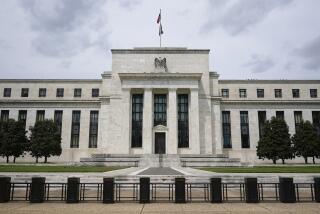Electronic Payment Law Caution Urged : Regulation: Fed officials are wary of placing restrictions on emerging systems, including ‘smart card.’.
- Share via
WASHINGTON — Federal officials on Wednesday advised a House panel to postpone any regulation of new electronic payment systems, saying the nascent industry should be allowed to develop further before restrictions are imposed.
Federal Reserve Board Vice Chairman Alan Blinder said the Fed “has not the slightest desire to inhibit the evolution of this emerging industry by regulation, nor to constrain its growth.”
Blinder and other federal officials told the House banking subcommittee on domestic and international monetary policy that although Congress should discuss privacy and security issues that new forms of payment present, this is a poor time to regulate the emerging industry.
“We don’t know enough yet to make good decisions,” said Stanley Morris, director of the Treasury’s financial crimes enforcement network. “The time is not yet right to ponder whether additional legislation is required.”
One of the new products, being developed at companies including Mobil Corp. and Visa International Inc., is the stored-value card. It will operate as an electronic wallet, taking the place of coins and bills for small purchases. It will be embedded with rechargeable microchips that keep track of the amount stored on the card.
Other new electronic systems would shift funds electronically.
Stored-value cards have yet to get off the ground in the United States, although they have been used in France for several years. Last year, U.S. consumers used currency for 73% of their transactions, checks for 17%, credit cards for 5% and debit cards for 2%.
“I expect that consumer acceptance of these cards will parallel the automated teller machine acceptance and rollout process that began 20 years ago,” sad Viveca Ware, director of payment systems at the Independent Bankers Assn. of America, a trade group representing small banks.
The new forms of payment raise some concerns that Congress will need to address, the panel members said. Among those are consumer privacy, the security of payment systems, the effect of the systems on the U.S. money supply and how poor communities will be affected.
The cards could carry risks for consumers, Blinder said. For example, issuers of the cards might invest consumer money received for card balances in risky assets to increase the issuers’ earnings. The clearing and settlement mechanisms for stored-value cards and similar products could also generate significant credit and other settlement risks, Blinder said.
Currently, there is no special legal framework to protect consumer stored-value transactions as there is for checks and other common retail payment mechanisms. Blinder said it is essential that those developing new payment technologies clarify the rights, obligations and risks consumers and merchants will bear.
Electronic products could pose opportunities for money laundering, officials said. Stored-value cards are not of much interest to criminals now because of their low balance limits. But the Treasury is concerned about the future.
“Smart-card transactions and international payments transacted over the vast Internet system could be immediate, potentially anonymous, effected in multiple currencies and conducted entirely outside of the traditional funds-transfer channels,” Morris said. “History has shown us that as we invent new technologies, criminals are waiting on the periphery to use them.”
Blinder told the subcommittee that electronic forms of payment are unlikely to damage the Fed’s control of the money supply and lead to inflationary pressures, unless they become very large and function largely outside the banking system.
More to Read
Inside the business of entertainment
The Wide Shot brings you news, analysis and insights on everything from streaming wars to production — and what it all means for the future.
You may occasionally receive promotional content from the Los Angeles Times.










